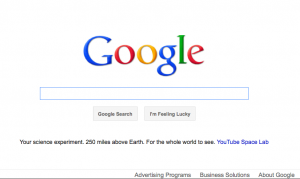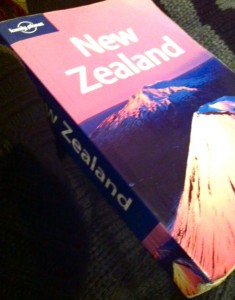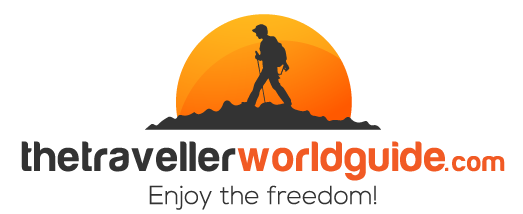By: Margyle

You could argue travel books are for techno-phobic geriatric globetrotters but that is only a half truth. It’s hard to argue the convenience of a trusty guidebook in your bag, dog eared and highlighted to death, complete with maps of the region and useful foreign phrases. These are not just used by old people and are very handy.
Any time a medium shift takes place there are a certain number of resisters and adopters; currently we reside in the overlap where both are used and some people use a combination for their planning. Smart companies employ both mediums to reach their audience, but digital isn’t the future, it’s the right now. Newspapers, books, magazines – these things will always exist in physical form, but where before it was the mainstay, it will occupy a niche reserved more for aficionados of the genre – more ornamental than functional. I love books, but the form is changing.
The biggest drawback to using the internet for research is also its strength, which is the sheer volume of information available. Particularly for a newcomer, it is ridiculously intimidating how much is out there. What do you type? Who do you trust? Publishing a book takes time – anyone can make a website that looks half presentable. For this, I completely understand the hesitancy to use the internet because it’s too damn big. Books are self contained, and for agoraphobic travellers out there, that’s comforting.
But don’t write the internet off just yet.

Of all the features Google has, the most invaluable to my travel planning has always been Google Maps. I mean, being able to plot routes and get travel distances before arriving is a stroke of genius. I used it to figure out where my Italian hostels were situated in relation to the train stations and for plotting my route on my Scotland road trip – I couldn’t imagine trying to do that with a guidebook map with the same precision. Add in the street view feature where available and getting your bearings just got a whole lot easier.
One thing that has always frustrated me about guidebooks is how they don’t give me enough information. Most guidebooks are designed to have something for everyone, but by doing this they are sometimes too brief in their accounts so as to remain a manageable size. If you hate art and are not going with kids, most guidebooks of Europe will be filled with unhelpful information. How many guidebooks publish prices of attractions? Not many, but this is because they are subject to change. This is where the internet shines – not only can you find out all of this up to date information, but you can get it from multiple sources to be certain of its accuracy.
So when it all comes down to it, should you Google or guidebook your trip? A lot depends on personal comfort, but unless the internet scares the crap out of you, it offers everything a book does and more.
Oh yeah… and visiting travel websites is a lot cheaper than books.


14 Comments
I’m against guidebooks mostly because they are too heavy to carry but I would reconsider given the kindle.
In Central America I highly recommend wikitravel.com really great information on how to get from place to place and where to stay.
Totally. But even using a Kindle is siding with the digital way of doing things. I was amazed on my recent trip to Italy how many people had iPads and were in tourist sites – I probably saw as many people with them as with guidebooks out!
Really? That’s crazy! I would be paranoid to use my electronics in public a lot of places for fear of thieves.
I love my guidebooks. Always try to get a copy when we move to a new country. I don’t think guidebooks and Google is mutually exclusive though. They work very well together (I use LP and wikitravel). The thing about Google Map is that often times they don’t have a close up view of a lot of cities in South America – so its usefulness depends a lot on where you’re traveling to. But I can see how in certain places with a lot of free wifi available and an Iphone, paper guidebooks can easily become obsolete.
I like my guidebooks as well.. mostly for the maps because I have issues with directions haha.
It’s really whatever you are comfortable with. There are so many maps online that you can find one pretty easily to fit your needs, but if you don’t want to look online then a guidebook works nicely.
But it’s kind of a paradox… maybe there isn’t as much on South America because it’s not as huge of a destination as other places, so people may use books rather than expand Internet resources. It’ll change though!
I’m old school and I love guidebooks. I’m also a dork and read them like novels, even for places I’ll probably never get to.
I have a serious problem…
HAHA amazing! I skim them and don’t always buy them for every destination, but they have come in handy. Alas, I have also found some of my most favorite hostels via Google, ones that weren’t in the book.
I like to start with a guidebook for some basic recommendations and to get a general idea of the touristy things to do. Then it’s all about the internet to get the latest and greatest info.
And you’re probably in the majority, which says something about how most people view the internet and it’s resourcefulness/accessibility. Wouldn’t it be nice if you could skip that first step and just go online? Maybe one day.
That being said… I love books lol
I’m a guide book girl. I started travelling before Google so just can’t give up bad habits AND I hate Google. Having said that though we do get a lot of recommendations from other travel bloggers, and our fanpage!
haha… why do you hate google?
Google is just the catch all term for any web based searching… but I find it interesting that you take the ‘I’m too old to change’ approach! Haha. It really does come down to what you are comfortable with and it’s good to see the medium is always evolving! Thanks for the input!
For a short trip, I usually don’t bother getting a guide book and search everything online. I use Tripadvisor suite a lot.
For longer trips I like to have (or borrow:p) a guide book to get a first idea of places I want to visit, things I want to see… After that first step, I check google maps to see where all my interests are located and in doing so I throw out the ones that are too distant/not easily accesible from the other ones… and after that I go only to ‘purify’ my trip (and find a bunch of other stuff I’d like to do as well:p).